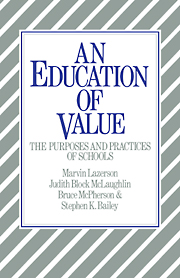Chapter 4 - Learning and excellence
Published online by Cambridge University Press: 05 June 2012
Summary
Discussions of education are filled with beguiling simplicities. There are, after all, things to be learned; there are the givens of a discipline or a subject: the curriculum. Tests can be created to measure what is learned and how well it is learned. And once we know what should be learned and can measure the amount of learning, then surely we can determine the best way to teach it.
Such simplicities underlie many of the current complaints about the schools. Academic standards have deteriorated, students are not working hard enough, teachers are insufficiently accountable. The remedies then follow: Increase academic requirements for graduation, test students more frequently, lengthen the school day and the school year. The complaints and the remedies are not necessarily invalid, but they are oversimplifications.
Consider the following, drawn from polls that ask Americans what they want from their schools.
(1) Discipline is the most serious problem facing the schools. By discipline, the public seems to mean that students obey the rules and show respect for authority.
(2) The curriculum should emphasize the basics, particularly mathematics, English grammar and writing, civics/government, U.S. history, science, and geography, and should contain more practical instruction and more vocational education. These should be taught so that academic standards are raised, more work done in school, and more homework required.
(3) Teachers should be well qualified. This seems to mean that they should be required to pass state board examinations before they are hired and should be regularly tested thereafter.
[…]
- Type
- Chapter
- Information
- An Education of ValueThe Purposes and Practices of Schools, pp. 63 - 80Publisher: Cambridge University PressPrint publication year: 1985



